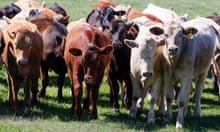It’s creamy-white in colour with a deep brown crust. It has a mild floury taste but with a moreish salty tang. It crisps up nicely in a toaster, and it’s the perfect accompaniment to butter, jam or hummus.
This is bread – but not as you know it. Scientists at the University of Reading are finding ways to make British diets far more nutritious and sustainable by stealth, replacing the soya flour, and some of the wheat, with broad beans – also known as faba or fava beans.
The challenge is to precisely recreate the flavour of white bread to reach consumers who wouldn’t necessarily be drawn to food marketed for its health benefits.
“We want to ensure the whole population gets the benefits of this bread, including disadvantaged populations, who often have more challenges in their diet. We’re trying to give them healthful food, and hopefully they won’t know the difference,” says Prof Julie Lovegrove, who is leading the project.
“We know what people should eat, but we need to motivate people to change their behaviour and that’s immensely challenging. Everyone knows, for example, how to lose weight – you move a bit more and you eat a bit less – but it’s a very difficult thing to do because we don’t eat for nourishment only, we eat for reward, as a social event, for comfort. If we can improve the health of food that people are happy to eat like the bread, they’ll get the benefit without having to change their diet.”
Fava bean bread is more nutritious because it contains more digestible protein, which increases feelings of fullness and could help people avoid overeating, as well as more iron and fibre, which many British people don’t consume enough of, especially those from disadvantaged backgrounds.

But – Hannibal Lecter references aside – the beans have a PR problem. Dr Jane Parker, the flavour chemist working on how the bread tastes, said that people avoid the beans because they think they have a bitter flavour. “It’s got to taste as good as your normal standard loaf – or better,” she says.
She believes this may be an unfair prejudice. She conducted an experiment with her own family: when she presented the bread as fava bean-based, she was told it was “too beany”. The next day she served the same loaf, and nobody noticed it wasn’t white bread.
Supermarkets are unable to dupe their customers in the same way, so instead the researchers are working with the British Nutrition Foundation to shift people’s negative perception of beans and pulses. The project is backed by £2m of government research funding as part of a wider programme to make UK food systems healthier and more sustainable.
Fava beans are endemic to the UK as they grow best in temperate climes, and they were a common protein source in Britons’ diets until the Industrial Revolution. But as processed food, and products from around the world, started to become available, beans fell out of favour.
Prof Donal O’Sullivan, whose expertise in crop sciences underpins the project, said that this was probably because beans “are more of an acquired taste, they need more flavour” – compared with, for example, the enduring popularity of peas, which are naturally sweeter. Successive generations have lost the cultural knowledge of growing, cooking and eating beans.

Yet fava beans are having something of a moment. They’re still widely produced, but are usually exported to the Middle East or used in animal feed. Tesco, which hails them as a “revolutionary crop”, is working with suppliers to roll them out across product ranges and ingredients.
This is partly because fava beans tap into the sustainability drive. Beans are known as “nitrogen fixers”, meaning they take nitrogen from the air and release it into the soil, removing the need for chemical fertilisers. Their flowers also attract bees, which is good for biodiversity. And most importantly, because they grow well in the UK they involve a lower carbon footprint than imported soya beans.
There are two potential drawbacks the scientists must address: one, that the level of acrylamide, a carcinogen, is not too high; and the other that it is edible for people with favism, a genetic disease which can cause a severe reaction to fava beans.
Over the next three years, the team will extensively test the bread’s nutritional profile, hold focus groups with consumers, and refine the recipe to ensure it perfectly replicates the taste – and cost of producing – white loaves. The team are working with Waitrose for now, but the goal is that it will be stocked in cheaper supermarkets.
O’Sullivan notes that it may surprise people to learn just how much research goes into everyday products. “There’s an amazing amount of science and knowhow that goes into getting the loaf just-so every time, and on a massive scale.”










